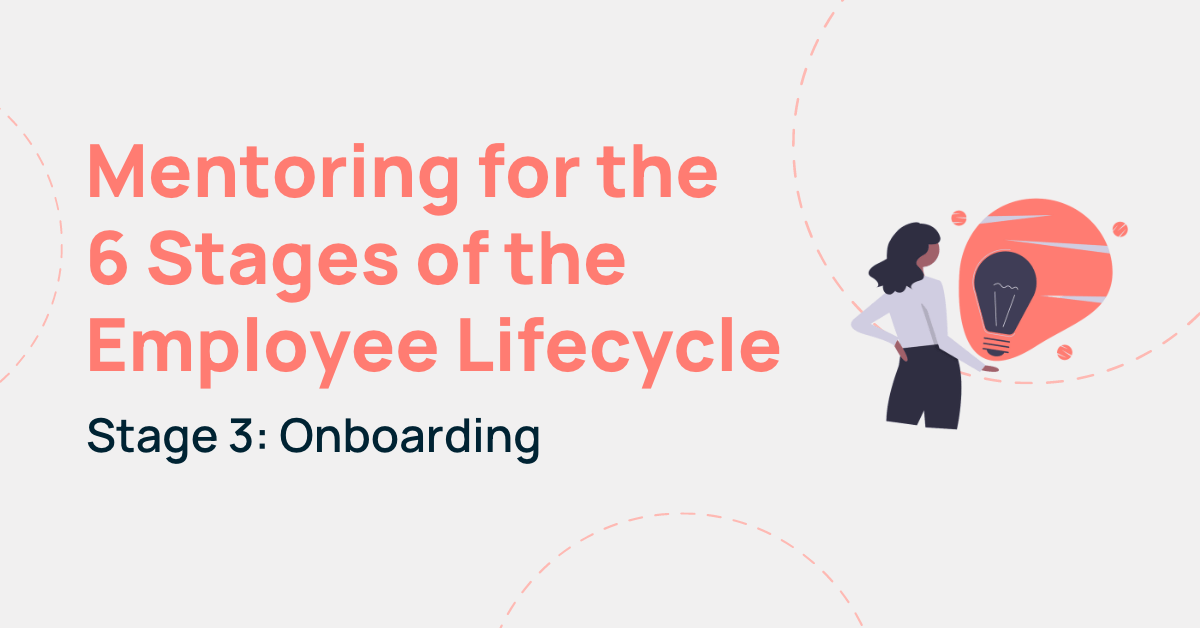So far in our “How to Weave Mentoring into the 6 Stages of the Employee Lifecycle” series, we’ve discussed:
- Attraction: The first stage in the employee lifecycle model should ensure the first touch with your company is a positive one. Include your mentoring program in all of the content you use to promote your company so that it’s the first thing prospective new hires see.
- Recruitment: Given the current War for Talent, a mentoring program can help you differentiate your company and recruit desirable employees. A mentoring program not only fosters relationship cultivation but also helps with brand building, making it easier to target job opportunities to folks who have already warmed up to your business.
What comes next? Once you’ve attracted and successfully recruited the right type of talent, now it’s time for employee onboarding.
This is Part Four of our series on Mentoring for the 6 Stages of the Employee Lifecycle. Read our introduction to the series here.
It May Be Time to Rethink Your Employee Onboarding Strategy
In order to really underline how important onboarding is to your overall employee experience—including retention—let’s first take a look at some statistics:
- 88% of organisations currently don’t onboard well. (Gallup)
- Up to 20% of turnover occurs within the first 45 days on the job. (Harvard Business Review)
- Employees who had a negative new hire onboarding experience are twice as likely to look for new opportunities in the near future. (Digitate)
- A poor onboarding experience can lead to 1 in 5 new hires being unlikely to recommend an employer to a friend or family member. (Digitate)
Why such dismal onboarding statistics? Because most companies are using outdated or ineffective onboarding tactics. Maybe their strategies are too quick or too process-based, aren’t adapted for the new hire’s age or other demographics, or they’re simply providing too much information at once.
Most employee onboarding structures look like this:
- Step 1: Wait at the door/reception/foyer feeling awkward as people go about their jobs.
- Step 2: Be greeted by someone with a welcoming workplace misconduct brochure.
- Step 3: Go through an ‘induction’ which may or may not include video content that should have died a long time ago.
- Step 4: Awkwardly scuttle to your desk/cubicle to start ‘working’ for your new company.
This can cost you, big time. Why? Because losing an employee in the first year can cost as much as three times that employee’s salary. On the other hand, what happens when you create a cohesive, strategic onboarding strategy? Glassdoor reports that organisations with a strong onboarding process improve new hire retention by 82% and productivity by over 70%. So how can you get these results?
Using Mentoring In Your Employee Onboarding Program
It’s important to remember that first impressions with new hires set the tone for the entire employer-employee relationship. Therefore, during the employee onboarding process, you want to quickly integrate new hires into their roles and into the company culture, people, and programs. Thankfully, a mentoring program can get your newbies up to speed on company processes and culture quickly, which in turn means you can get them on the fast track to productivity.
Onboarding is also the ideal time to ensure top performers understand, value, and integrate with all the company’s core values and perks. Mentoring can help you reach all of these goals.
How Mentors Can Benefit Your Onboarding Program
Mentoring is a great addition to your onboarding program because it can get your newbies up to speed on company processes and culture quickly. This means you can get them on the fast track to being productive sooner. Here’s exactly how a mentor can help.
Guide New Hires
A mentor can guide new hires on the ins and outs of how things work. After all, no two companies are alike. Different organisations have different SOPs and ways of working that might need some getting used to, and that’s where mentors come in. Instead of having to learn by trial and error—and losing lots of valuable time in the process—new hires can learn the intricacies of their new workplace faster with a mentor.
Get Them Comfortable Quicker
On a similar note, mentors can help new hires get more comfortable in their new position and company quicker. Newbies can feel quite alone and awkward when starting out in a new organisation and having a mentor or buddy can ease that. Knowing they have someone they can chat with about anything relating to their new workplace—like the best and/or cheapest lunch spots, Slack channel recommendations, the best person to contact for a specific request, etc.—can be comforting and ease some of those newbie nerves.
Navigate Company Culture
A mentor can also help new hires learn about and navigate company culture. If you’re a seasoned pro at your current company, sometimes it can be hard to remember that there’s always some adjustment to be made when joining a new workplace. Having somebody share with you what the culture is like and how to best navigate it can make new hires feel welcomed and supported from the get-go. An established employee can also ensure a positive first impression of the organisation’s culture and environment.
Networking and Development
Mentors can play an early part in the mentees’ development – whether they are in the same department or not. Onboarding mentoring programs give mentees access into an employee’s existing network and circles during the first days and weeks of an employee’s tenure. This provides a support network for the new employee moving forward.
Additionally, mentors may end up sponsoring the new hire for promotional and leadership opportunities in the future (77% of men and 68% of women who have a sponsor reported being satisfied with their career advancement).
It’s not just the new employees who benefit from a structured onboarding process. Mentors involved also get something out of them. They feel more valuable to the organisation, create new acquaintances, and become more actively involved in the evolution of their workplace culture.
Easily Make Mentoring a Part of Your Onboarding Strategy
The right onboarding program can significantly increase long-term retention and accelerate an employee’s productivity ramp. Thankfully, one way to successfully achieve these results is by integrating your mentoring program into your employee onboarding strategy. Here are a few things we recommend when undertaking this initiative:
Make It Informal
Start with a more informal, peer mentoring setup. In our experience, this is a more-friendly approach that puts less pressure on the participants.
Use New-To-Your-Company Mentors
Mentors don’t always have to be team members who have been at the company for five years or longer. Sometimes, it’s actually beneficial to have a mentor who maybe only joined the company in the last 12-24 months because their experience with being a newbie is still fresh.
Provide A Loose Structure
Provide a loose structure to guide participants, but don’t make it too prescriptive. No one likes being held to a strict program, especially when it comes to something that should be fun and beneficial like mentoring.
Start Before Day One
According to Aberdeen, “best-in-class” companies are 53% more likely to begin the onboarding process before day one, ideally right after an offer has been accepted. But practically, how do you actually go about doing this?
The buddy program for new graduates has long been a staple offering of many large global consulting firms. However, it’s never really been extended beyond that to become an offering for all new employees.
Connecting new hires before they’ve even started with a peer mentor is an easy and effective way to start making people feel connected, engaged and supported before they’ve even stepped into the office. Mentoring does not always have to be about career progression. In a world of rapid change, uncertainty and a sense of isolation, people are becoming more concerned about fitting in, and finding their tribe and purpose. If your company can accelerate this sense of self and purpose during the onboarding experience, then you are going to have not only more engaged and productive employees but also more loyal ones.
Retention Starts At Onboarding: Beyond The First Day
The benefits of onboarding mentoring programs go well beyond the first day for new hires – and for the organization. Zynga is a great case study and an example of a successful new graduate program beginning with a weeklong (mentoring-driven) onboarding boot camp:
‘Zynga wants their new grads to be challenged and integrated into the culture – but also wants their mentors to be challenged through reverse mentoring, with fresh new employees bringing new ideas and an outside perspective. Both parties work together to innovate, learn from, and challenge one another in a dynamic and stimulating environment’.
These types of formalised practices create real, material changes in the workplace. Consider the impact a perpetual cycle of positive onboarding experiences for new hires can have on your workforce – where every new hire is grateful for their mentor, and in turn ‘pays it forward’ by later becoming a mentor themselves.
Measuring Onboarding Success
So you implement a mentor onboarding program at your organisation. How do you know if it’s working?
Early Turnover
One of the surest signs of great onboarding is low new employee turnover. The absolute number is not what is important (right now) but the relative number to your organisation is. Take a look at (or begin tracking) your new employee turnover – and then measure against that after implementing a structured onboarding sequence. Effective onboarding should seep through all levels of retention, so over time you should see improved retention all the way up and down tenure.
Employee satisfaction
A well-onboarded employee is also going to be more satisfied with their first couple of weeks and months. Try implementing a 90-day feedback survey to see how the employee enjoyed the onboarding process – and where they feel it could be improved.
Culture
Culture is a pretty soft term, and isn’t easily measured. But you can sometimes feel it. Providing your new employees with a mentor buddy should impact the mentees (new hires) and mentors (current hires). And between these impacts and increased interactions, your culture should improve and become more inclusive.
Look to the future
Don’t leave new employees to figure it all out on their own – maximise their development and tenure at your organisation through an employee mentor who has been through the exact same environment that they themselves are navigating today.
It’s time all organisations started leveraging their most powerful form of social proof to make better first impressions.
How’s your onboarding process?
If you’re interested in learning more about how your organization can benefit from embedding mentoring into all stages of the employee lifecycle, download the webinar kit for a series on this very topic.
Join Mentorloop’s Head of Sales for EMEA, Jess Benham as she discusses the benefits of embedding a culture of mentoring in your organization to support all 6 stages of the employee lifecycle.
Mentorloop Enterprise takes your mentoring program to the next level with powerful algorithmic matching, customisations, single sign-on, and more—ensuring a cohesive employee experience from start to finish.
Ready to find out how mentoring can benefit your business? Learn more about Mentorloop Enterprise today.
Check Out Mentorloop Enterprise




